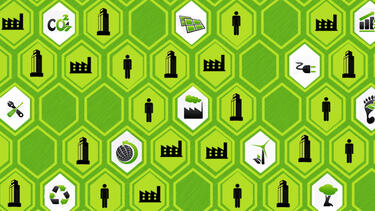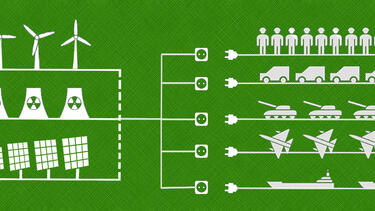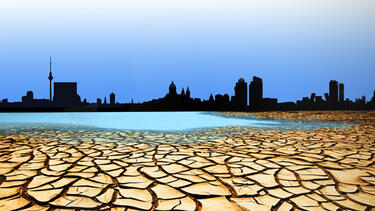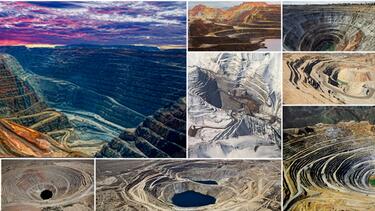Sustainability
Renewable Energy Is Easier Than Ever to Build—and Harder to Talk About
Advances in technology and a maturing development ecosystem have made renewable energy more economical, less risky, and increasingly rewarding for landowners, says Reid Buckley ’89, a partner at Orion Renewable Energy Group. But it has also become more politicized.

How Can Businesses Lead On Sustainability?
Problems like climate change, resource depletion, and pollution can seem so large as to be beyond the capacity of any individual person, or even corporation, to address. Peter Bakker, president of the World Business Council for Sustainable Development, argues that business leaders can take a first step by incorporating sustainability concerns into how they think about risk management.

Is Sustainability Essential to the Mission?
Perhaps the strongest argument for environmental sustainability within an organization is that it is critical to the mission. Deputy Assistant Secretary of the Army Richard Kidd ’93 explains why strategic thinking about sustainability is essential for the military.

How Can Social Entrepreneurs Respond to the Growing Freshwater Shortage?
Anupam Bhargava, CEO of Clearwater Systems, discusses the role of cleantech in ensuring a sustainable water supply.

How does China drive the mining and metals business?
The $1.5 trillion mining and metals sector supplies the feedstock for a large part of everyday life—from coal for power, to iron ore for steel girders, to the minerals and metals that are processed into the components of your iPhone. John Lichtenstein '83, a consultant and 30-year veteran of the sector, describes the state of this global industry and how one country—China—has an outsize influence on commodity prices everywhere.

What is environmental security?
A country runs out of drinkable water. What's its next move? And how will its actions affect neighboring countries? The national security community has developed data, expertise, and plans for responding to threats caused by environmental problems.
Should the government subsidize alternative energy?
When solar panel manufacturer Solyndra went bankrupt after receiving millions in federal loan guarantees, some said that the government should stop interfering in energy markets. Nancy Pfund and Ben Healey show that the U.S. government has a long history of subsidizing emerging forms of energy, dating back to the 19th century.
Where should our trash go?
There's a recycling bin on every doorstep, as cities push to recycle as much solid waste as possible. But Lanny Hickman, the former executive director of the Solid Waste Association of North America, says that we should think of recycling as just one more way to remove solid waste, with its own costs and benefits. He argues that we waste an opportunity by not converting more of our garbage into electricity.
What does sustainability mean at Yale?
Yale University is striving to integrate sustainability into the institution's operations, as well as its educational and research functions. Julie Newman, the director of Yale's office of sustainability, discusses the efforts at Yale and across higher education.
Can solar bring power to India’s rural poor?
Harish Hande is the founder of SELCO, a social enterprise established in 1995. The company provides sustainable energy solutions and services to under-served households and businesses in rural parts of Karnataka and Gujarat. Can this "open-source organization" provide a model for powering economic development without devastating the environment?
So you want to work in sustainability?
As more and more companies integrate environmental concerns in their business functions, the role for sustainability professionals has grown. The founder of Sustainability Recruiting comments on this developing field and provides advice for people interested in working in the area.